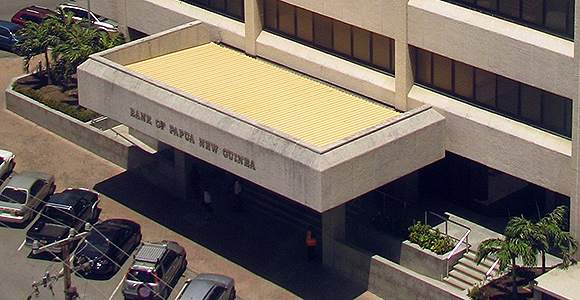Bank of Papua New Guinea issues new directive on forex order priorities
Authorised foreign exchange dealers must fully clear essential trade and services orders before executing any orders for non-essential items such as dividends, under a new directive issued by Papua New Guinea’s central bank. Business Advantage PNG finds out what this means for businesses.

Bank of Papua New Guinea building in Port Moresby. Credit: BAI
Foreign exchange dealers, including Papua New Guinea’s banks, must fully clear foreign exchange orders for “essentials” such as food, medicine and critical raw material imports before executing any orders for “non-essential” services or for capital payments such as company dividends, under a new directive issued by the Bank of Papua New Guinea on October 24.
PNG has been suffering from ongoing foreign exchange shortages for the past decade, with this issue consistently ranking as one of the top impediments facing businesses in our annual Business Advantage International/Westpac PNG 100 CEO Survey.
This latest directive does not introduce substantive policy changes, but rather “clarifies forex order execution prioritisation,” Rohan George, Group General Manager Treasury and Markets at BSP Financial Group, tells Business Advantage PNG.
Essential orders
Under the directive, the BPNG will no longer directly verify all foreign exchange orders. Instead, authorised foreign exchange dealers (AFEDs, consisting of the commercial banks and a handful of other licensed institutions) must undertake the verification process themselves, forwarding copies of documentation for orders exceeding K3 million to the central bank.
AFEDs may utilise commercial flows of foreign exchange as well as supplies purchased from the BPNG (which currently sells US$125 million in forex per month to the domestic market, according to the central bank’s September monetary policy statement)
Transactions classified as “essential” orders by the directive include:
- Importation of essential goods and services, including food, medicine, and critical raw materials and intercompany loans related to underlying import transactions;
- Payments for contracts related to public health and safety, infrastructure development, lease payments, licenses, fees and subscriptions; and
- Any other orders classified as essential based on prevailing economic and social needs.
It directs that the following sectors must be prioritised for foreign currency allocation: food and beverages, retail, wholesale, petroleum, health and education, manufacturing, transport, agriculture, utilities, government and social services, and telecommunications.
Non-essential orders
The directive defines “non-essential” orders as transactions that are not critical for the immediate operation of the economy or a business. It breaks these down into three categories:
- Service sector payments: these are considered non-essential when they relate to non-critical needs which can be deferred or forgone in favour of more urgent financial obligations;
- Dividend payments: these are considered as not mandatory for a company’s operations and can be adjusted or suspended based on the company’s financial health; and
- Offshore investments: these are also considered to be not fundamental to a business’s operations and are deemed non-essential during periods of financial constraints. This category also includes offshore investment by investment funds.
According to BSP’s George, around 30 per cent of forex demand falls under capital transactions such as dividends and offshore investments, which are all deemed non-essential under the directive. The remaining 70 per cent is for trade and services, some of which is also defined as non-essential.
These rules have not led to any changes in outstanding forex orders but have resulted in “a build-up in outstanding dividends and capital remittances, and slightly less [of a build-up] in trade and service orders,” George says.
Business affected
Murray Woo, President of the Manufacturers Council of PNG, tells Business Advantage PNG that the directive has been “known about for a while” and that it aims to control the outflow of funds.
“There will be businesses affected, no doubt – de-prioritising dividends for investors is never a desirable move,” Woo says.
He notes that individual forex orders need to be handled on a “case by case” basis and will depend in part on a business’s relationship with its bank.
Rio Fiocco, President of the Port Moresby Chamber of Commerce and Industry, says the directive is “only an iteration” of earlier announcements by the BPNG. Nevertheless, he notes the impact of the measures on the business community.
“Unfortunately, continuing to put orders under a microscope and passing responsibility around on screening orders to prioritise them does nothing to address the underlying problem,” Fiocco says.
“Throughout this entire crisis, commodity prices have ridden high, we should be flush with remittances, the underlying cause is the inability of the State to bring 100 per cent of its own earnings or coerce exporters to repatriate more earnings. Our officials, economic advisers and the IMF, all the while continue to pin their hopes on devaluing, or balancing our kina – which has and will continue to fail.”
Alleviating forex shortages
Sohrab Rafiq, the International Monetary Fund’s (IMF) Resident Representative in PNG, tells Business Advantage PNG that one of the key policy objectives of the central bank’s IMF-supported reform program is to “alleviate forex shortages,” which he notes have been “a longstanding impediment” to doing business in PNG.
“To address forex shortages and return to kina convertibility, the authorities are committed to a gradual transition to greater exchange rate flexibility and a more effective monetary policy framework,” he says.
“Going forward, consistent with its roadmap of reforms, the BPNG remains committed to continue with the gradual and cautious removal of forex rationing measures, by continuing to review the pertinence of current reporting requirements, regulations and directives on the forex market.”






